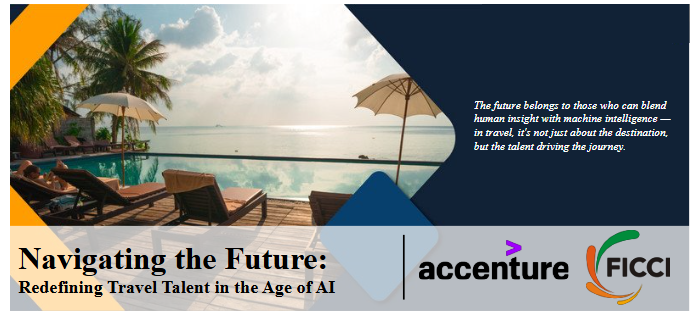Why Reimagine Talent?
AI-Driven Workforce Evolution:
- Artificial Intelligence and automation are not eliminating roles outright but are fundamentally transforming how work is executed, demanding new ways of thinking, learning, and operating.
From Roles to Capabilities:
- The shift from fixed job titles to dynamic skillsets is reshaping talent strategies. Organizations now prioritize capability agility and continuous learning over static role definitions.
Global Talent Paradox:
- While organizations face widespread talent shortages, job displacement is simultaneously increasing, highlighting a growing skills mismatch rather than an overall labor deficit.
In today’s rapidly evolving travel landscape, talent has become a strategic differentiator, not just an operational necessity. As global travel brands recalibrate in a post-pandemic world, the focus is shifting toward talent transformation as a critical enabler of resilience and growth.
From airlines and hotel chains to cruise operators and digital travel platforms, the conversation is moving beyond managing attrition—towards building adaptive, future-ready capabilities that can thrive in an AI-augmented environment.
To succeed, today’s leaders must prioritize the redefinition of work, the reshaping of the workforce, and the re-engagement of workers—with a sustained emphasis on continuous skilling, agility, and innovation.
The Churn Challenge: A Global Concern
In an AI-enabled world, talent is no longer defined solely by experience or credentials. What truly matters now is cognitive agility, the ability to learn, unlearn, and relearn. Success hinges on fluency in human-AI collaboration, strong ethical judgment, and creative problem-solving capabilities.
Across the travel industry, talent churn has become a top concern for the C-suite. According to a recent Accenture study, travel companies are experiencing annual attrition rates exceeding 20% in critical digital and technology roles. This trend is more than an HR challenge—it poses a significant risk to business performance.
High attrition among skilled resources delays digital rollouts, undermines customer experience initiatives, and impedes the success of large-scale transformations such as New Distribution Capability (NDC), Revenue Management System (RMS) modernization, and SAP S/4HANA migrations.
A Shift from Role to Specialization
Driving strategic transformation in workforce management, organizations are shifting from viewing employees by their job titles to recognizing them for their skills, potential, and adaptability.
Progressive travel industry leaders are embracing a more holistic approach—moving beyond traditional role backfilling to focus on developing deep specialization and building a cross-skilled, agile, and business-aware talent bench that’s future-ready.
There are three key pillars to this shift:
1. Functional Specialization with a Modern Lens
In today’s evolving workplace, employees are no longer confined to rigid job roles—they are empowered to apply their strengths across both functional and cross-functional domains. This flexible approach enables more agile and impactful deployment of talent to meet business needs.
For instance, areas such as revenue management, loyalty programs, and offer-order retailing increasingly demand professionals who not only understand legacy platforms but also have a grasp of emerging technologies and evolving trends in customer behavior.
2. Blended Talent Pools
- The traditional divide between functional and technical roles is blurring. Today, hybrid professionals who can bridge business and IT—especially in areas like mobility, customer experience, and back-office automation—are in high demand.
Enhanced talent utilization and engagement—employees are increasingly recognized for their potential rather than just their current roles. This shift fosters a culture of continuous learning and development, ultimately enabling faster and more agile deployment across the organization.
Addressing the Churn from Reactive to Proactive
Top executives agree that solving churn cannot be about firefighting. It requires a foundational rethink.
a) Talent Incubation Hubs & value unique human traits in hiring
• Many are investing in Travel Academies or Capability Labs—dedicated spaces to train fresh talent in travel domain essentials, platform capabilities, and real-time problem solving.
b) Automation of Low-Value Tasks & encourage people to co-evolve with AI Tools & Solutions
• By automating repetitive tasks, organizations are freeing up high-value talent to focus on strategy, innovation, and experience design.
Technology as Talent Magnet
Interestingly, technology is not only reshaping work but also helping attract and retain the right talent.
AI-based tools are helping HR teams map skill adjacencies, recommend learning pathways, and predict attrition risks. Gamified learning experiences are making upskilling more engaging. And collaborative platforms like Microsoft Viva, SAP Work Zone, and Mural are enabling seamless virtual onboarding, feedback loops, and knowledge sharing.
The Road Ahead: Reinvention as a Culture
If there is one consensus among industry executives, it is this: talent reinvention is not a project. It is a culture.
Leaders must now focus on continuous learning and re-learning:
- Building internal champions for learning
- Partnering with academia and startups
- Fostering communities of practices across towers
- Recognizing and rewarding cross-skilling
Final Thoughts
Reimagining talent in today’s era isn’t merely about navigating disruption, it’s about leveraging it to build organizations that are more adaptive, inclusive, and intelligent.
In the decade ahead, the travel industry’s success will hinge not only on seamless experiences or competitive pricing but on the strength of resilient, inspired, and future-ready teams. The true differentiator won’t be just talent retention, but talent reinvention. As industry transforms, its people must evolve alongside it—emerging not just as employees, but as strategic partners in shaping the next era of travel.

Renu Bhatia
FICCI Member & LinkedIn: Renu Bhatia |

Manish Ahuja
Assistant Secretary General & LinkedIn: Manish Ahuja | LinkedIn |

Ashish Singh
FICCI Member & LinkedIn: Ashish Singh |
|






Leave a Reply